This website uses cookies so that we can provide you with the best user experience possible. Cookie information is stored in your browser and performs functions such as recognising you when you return to our website and helping our team to understand which sections of the website you find most interesting and useful.

As the coronavirus outbreak spreads across Europe, Gwyneth Paltrow has been pictured wearing a heavy-duty face mask as she flies to Paris for fashion week.
Several towns in northern Italy are currently on lockdown, while Germany, Spain, Austria, Switzerland and Croatia have all reported their first cases.
The actor uploaded a selfie to Instagram showing her dressed in a black mask covering her mouth and nose while sitting in her plane seat.
Paltrow starred as patient zero in the 2011 film Contagion, which sees a deadly virus sweep the world.
She captioned the Instagram post: “En route to Paris. Paranoid? Prudent? Panicked? Placid? Pandemic? Propaganda? Paltrow’s just going to go ahead and sleep with this thing on the plane. I’ve already been in this movie. Stay safe. Don’t shake hands. Wash hands frequently.”
Created with Sketch.
Created with Sketch.
1/10
A man wearing a face mask crosses a road in Wuhan, the epicentre of the novel coronavirus outbreak.
Reuters
2/10
A view of the empty entrance to the Università Cattolica (Catholic University) in Milan, northern Italy, on 24 February, 2020.
EPA
3/10
Empty streets in Daegu, South Korea, on 23 February, 2020.
EPA
4/10
Empty streets in Daegu, South Korea, on 23 February 2020.
EPA
5/10
A lone sanitation worker sits near the closed Hankou Railway Station in Wuhan, Hubei province, China, on February 24, 2020.
Reuters
6/10
A view of a deserted street in Codogno, northern Italy, on February 23, 2020.
EPA
7/10
Italian police officers set a road block in Codogno, Northern Italy, on Monday, Feb. 24, 2020.
AP
8/10
A supermarket closed in Codogno, one the northern Italian towns placed under lockdown, on February 23, 2020.
EPA
9/10
A lone cyclist wearing sanitary masks pedals in the center of Codogno, Northern Italy.
LaPresse via AP
10/10
An empty road at the entrance of the small Italian town of Codogno on February 23, 2020.
AFP via Getty
1/10
A man wearing a face mask crosses a road in Wuhan, the epicentre of the novel coronavirus outbreak.
Reuters
2/10
A view of the empty entrance to the Università Cattolica (Catholic University) in Milan, northern Italy, on 24 February, 2020.
EPA
3/10
Empty streets in Daegu, South Korea, on 23 February, 2020.
EPA
4/10
Empty streets in Daegu, South Korea, on 23 February 2020.
EPA
5/10
A lone sanitation worker sits near the closed Hankou Railway Station in Wuhan, Hubei province, China, on February 24, 2020.
Reuters
6/10
A view of a deserted street in Codogno, northern Italy, on February 23, 2020.
EPA
7/10
Italian police officers set a road block in Codogno, Northern Italy, on Monday, Feb. 24, 2020.
AP
8/10
A supermarket closed in Codogno, one the northern Italian towns placed under lockdown, on February 23, 2020.
EPA
9/10
A lone cyclist wearing sanitary masks pedals in the center of Codogno, Northern Italy.
LaPresse via AP
10/10
An empty road at the entrance of the small Italian town of Codogno on February 23, 2020.
AFP via Getty
Across the world, more than 2,000 people have died from the novel coronavirus, official name Covid-19, while it has sickened thousands more.
Aircraft are typically a breeding ground for bacteria, given that a large number of people are enclosed in a small airless space.
In a 2018 study tracking the “behaviours, movements and transmission of droplet-mediated respiratory diseases during transcontinental airline flights”, a research team led by Atlanta's Emory University found that those in window seats had far fewer encounters with other passengers than people in other seats.
This remains constant even when taking into account the fact that passengers aren’t stationary but move around the cabin during a flight.
Despite Paltrow's efforts to avoid the virus, doubt has been raised over whether face masks can protect against infection.
Dr Jake Dunning, head of emerging infections and zoonoses [infectious disease spread between humans and animals] at Public Health England, told The Independent that there is “very little evidence of a widespread benefit” in members of the public wearing masks.
He added: “Face masks must be worn correctly, changed frequently, removed properly, disposed of safely and used in combination with good universal hygiene behaviour in order for them to be effective.”



 Africana55 Radio
Africana55 Radio 

